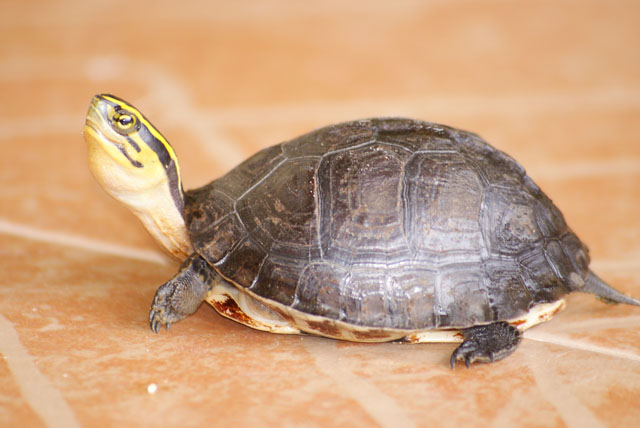A researcher has identified the first Australian case of a captive turtle being infected with a highly contagious disease, which has the potential to spread to humans. If let unchecked, the disease could have a huge impact on Australian native species.
The research will be presented at the Australian Veterinary Association's Unusual and Exotic Pets Annual Conference on Sunday.
Debbie Bannan, a second year veterinary science student from James Cook University in Townsville, says she discovered the disease on an Emydura macquarii, a common species of pet turtle, which was brought to a vet clinic where she was volunteering.
She says the turtle presented with a lesion on its front forelimb, which they thought was an isolated inflammation of the bone and could be treated by amputating its limb and flipper. "It started to rehabilitate really well," says Ms Bannan. "But three months after that it rapidly went downhill and reluctantly we had to euthanise it."
Ms Bannan says when they conducted a post-mortem, they found the turtle had a bacterial disease, called mycobacterium, that had spread throughout its entire body. "Mycobacterium is much like staph on human skin, and it can be carried by lots of animals," she said.
The bacterium is not pathogenic until it enters the body, through air passages, cuts or the intestines, she says. Ms Bannan says mycobacterium does not usually affect healthy animals, but it can have serious consequences for animals that are immuno compromised.
She says treatment for mycobacterium in captive turtles can be lengthy and costly. "It can take six to 12 months and it's not always successful," she said.
Once the bacterium has spread throughout the body, the turtle will most likely need to be euthanised, she says.
But what concerns Ms Bannan about her research, is that there are no previously recorded cases of mycobacterium in captive turtles in Australia.
"If there is no literature it means it's harder for vets to identify and treat quickly," she says.
Wild turtles at risk
Ms Bannan is concerned the disease could transfer to species in the wild.
Often people buy turtles because they are "very cute" when they are young, but people find they do not have room for them when they grow and throw them into nearby river or water way, she says.
"They can survive there and then become a threat to native species in the wild," she said. Ms Bannan says mycobacterium can also transfer to humans.
She says there are reported cases in the US, of children being infected with mycobacterium from their pet turtle. "It can get in your cuts and cause a lesion," she said.
But Ms Bannan says it is unlikely to make humans sick if they are fit and healthy. "It's no Hendra virus," she says. Ms Bannan says the same risk applied to other pets.
Source - ABC News
Categories:
Animals
,
Weird News










0 comments:
Post a Comment